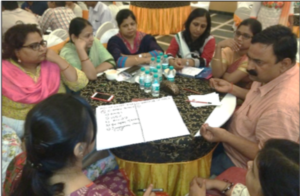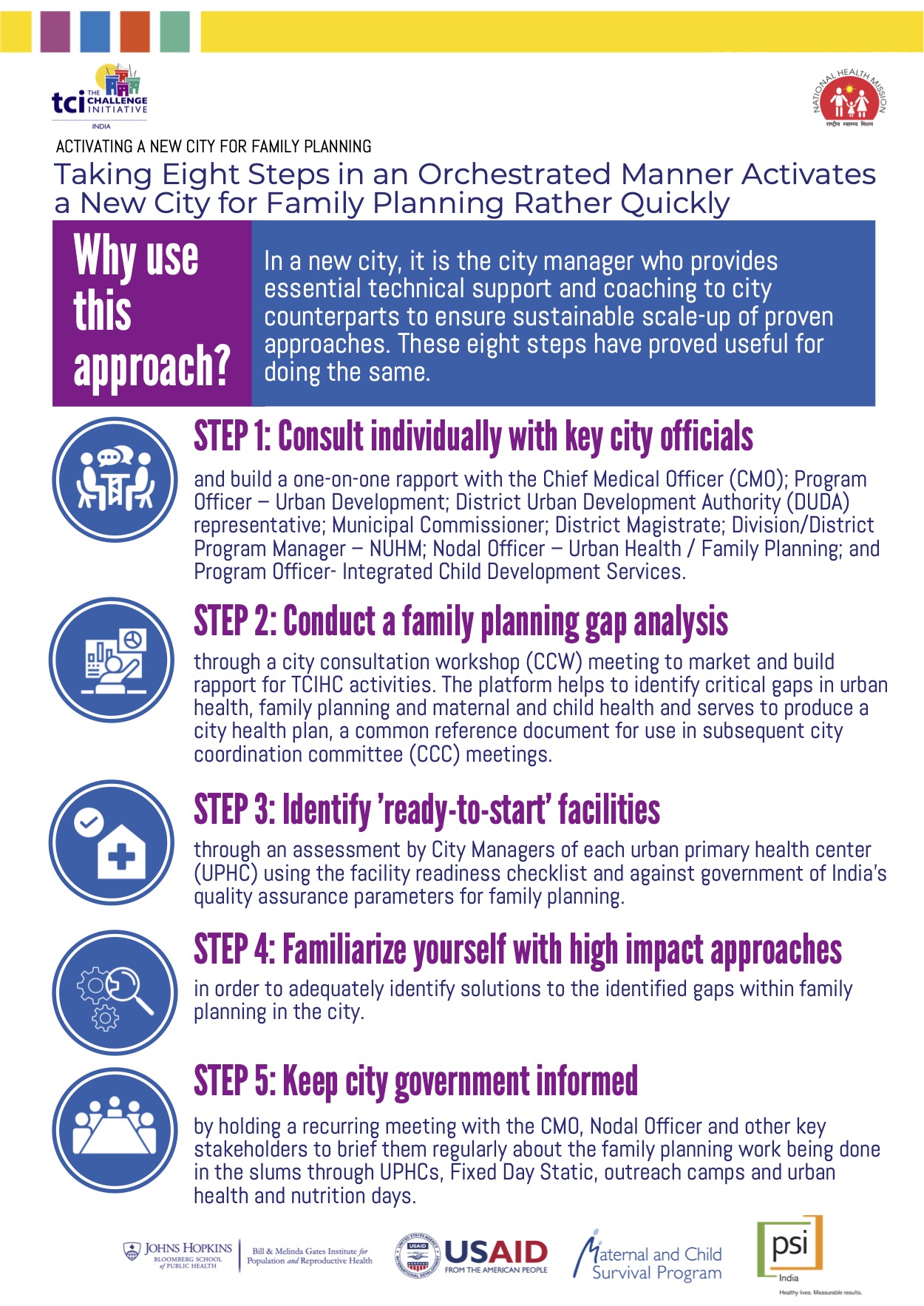India Toolkit: Advocacy
- Home
- Help and Support
- Close
- Toolkits
- Global Toolkit
- AYSRH Toolkit
- Hub Toolkits
- Core High-Impact Practices
- Gender Essentials Mini Course
- Close
- Resource Collection
- Community of Practice
- Coaching
- Log In/Register
- My Profile
- English
Eight Steps to Activate a New City for Family Planning
 Purpose: Over time, TCIHC has learned that if certain steps are taken in an orchestrated manner then activating a city for delivery quality family planning services becomes easier and quicker. This tool is designed to serve as guidance for new TCIHC City Managers to rapidly establish quality family planning services across a TCIHC-supported city.
Purpose: Over time, TCIHC has learned that if certain steps are taken in an orchestrated manner then activating a city for delivery quality family planning services becomes easier and quicker. This tool is designed to serve as guidance for new TCIHC City Managers to rapidly establish quality family planning services across a TCIHC-supported city.
Audience:
- Manager Programs / City Manager, TCIHC
- Manager Programs, NGOs
Background: Unlike other development projects, The Challenge Initiative for Healthy Cities (TCIHC) is all about being a facilitator, ensuring city government can implement a package of proven family planning-related interventions. While the entire TCIHC team works towards this objective, it is the Program Managers in the cities (also referred to as City Managers) who provide essential technical support (i.e., coaching) to city counterparts, helping them to navigate and leverage government processes and structures to ensure sustainable scale-up of the proven approaches. Having said that, it is not easy to work with the government system when you are an outsider. However, TCIHC City Managers have proven that it is doable to gain acceptance and achieve results. The following tips have been found to be of use in doing the same.
Evidence of Effectiveness
TCIHC successfully experimented with this strategy in onboarding its new City Manager and rapidly establishing quality family planning services across Kanpur. The city of Kanpur was added to TCIHC cities in April 2018. To facilitate TCIHC’s work in the city, the City Manager joined in July 2018. Within two months of joining, 44 of the city’s 50 facilities had started providing family planning services. This was accomplished because the City Manager followed the following guidance.
Guidance on Activating a New City
Common practices that ensure the success of TCIHC City Managers in helping to galvanize results include:
1. Consult individually with key city officials
Any person desiring to work in urban family planning in a city must consult the following key officials: Chief Medical Officer (CMO/CMHO/CDMO); Program Officer – Urban Development; District Urban Development Authority (DUDA) representative; Municipal Commissioner; District Magistrate; Division/District Program Manager –NUHM; Nodal Officer – Urban Health / Family Planning; and Program Officer- Integrated Child Development Services . A healthy one-on-one rapport with these movers and shakers of the city will ensure TCIHC’s model is understood and supported, which in turn facilitates the implementation of the proven approaches.
Timeline: Ideally within first month of starting, City Managers should meet all of the respective persons listed above individually.
2. "Know your city" exercise: Conduct a family planning gap analysis
Hold a city consultation committee (CCC) meeting as soon as possible after you set foot in a city. This becomes the first platform of marketing TCIHC to a group of stakeholders and encourages rapport building among all of the stakeholders working for urban health in the same city, who may be meeting each other for the first time given their varied expertise and points of entry/interventions within urban health. This platform helps identify critical gaps in urban health, family planning, maternal and child health, etc. It also helps produce a city health plan, which serves as a common reference document for everyone to follow in subsequent CCC meetings.
The following pre-planning steps are required for organizing a CCC meeting:
- Mapping and validation of stakeholders
- Finalizing date and time in consultation with stakeholders
- Ensuring invitations are issued from the CMO’s office and any necessary follow-up required
- Finalizing the agenda and activities for the day-long meeting
- Making logistical arrangements
Timeline: Ideally within two months, City Managers should hold the CCC meeting.
3. Identify ‘ready-to-start’ facilities
Immediately, City Managers should visit each urban primary health center (UPHC), gather its details related to family planning (refer facility readiness checklist) and assess it against government of India’s quality assurance parameters for family planning. Based on this, identify ‘ready-to-start’ facilities where the Fixed Day Static (FDS) approach can be started immediately with minimum input.
Timeline: Simultaneously initiate this exercise while doing the ‘know your city’ exercise.
4. Familiarize yourself with the high impact approaches (HIAs)
By doing city consultation and further assessing gaps in the UPHCs, City Managers gain a better understanding of what is required to move family planning uptake in the city. While you identify gaps, also provide solutions to overcome them. So, having a good grasp and knowledge of the HIAs is imperative since they can be the solutions required for fulfilling the identified gaps of the city. Always keep a copy or two of key HIAs handy with you.
5. Identify and keep the ‘movers and shakers’ of the city government informed
Make a ritual of meeting with the CMO/CMHO/CDMO, Nodal Officer, and other key stakeholders and identify at least two stakeholders who are key to getting the work done. Brief them regularly about the family planning work done in slums through UPHCs, FDS, outreach camps (ORCs), urban health and nutrition days (UHND), etc. Also, understand the dynamics between the CMO/CMHO/CMDO and his/her team. Sometimes, including the Nodal Officer hastens the process for approvals.
6. Use data for decision-making and amplify TCIHC’s work
Use data to advocate for improving family planning services. This may entail data regarding the status of needed equipment, supplies, health care provider trainings, the status of human resources, recent family planning uptake in UPHCs and role of TCIHC in supporting them, etc. Do a simple time series or trend analysis and present it in key forums, such as urban health review meetings, family planning review meetings, District Health Society Meeting, District Magistrate Meeting and urban local body meeting, among others.
7. Become part of government social groups and showcase TCIHC work
Share important daily happenings related to family planning work in the social media platforms of the city government, such as National Urban Health Mission (NUHM) group, Uttar Pradesh (UP) Technical Support Unit (TSU) group, etc. This updates the CMO, and sharing progress of work builds credibility of TCIHC but also of the CMO and his/her team. This platform can trigger discussions, which can help in convergence with various other departments.
8. Participate in regular meetings at different levels
Participate in every urban family planning review meeting, urban health review meeting, and MoIC monthly meeting, and at least one or two ANM/ASHA meetings every month. Facilitate the ASHA/ANM meeting, and bring out challenges and gaps in reaching out to and counseling women on adopting modern family planning methods. Address these issues by doing joint field visits yourself and through the field team. Gradually, ANMs should be able to hold review meetings with ASHAs in a similar manner, and the City Manager can focus more on district-level meetings.
Roles and Responsibilities
Role |
Responsibility |
| City Manager/Manager Programs |
|
Monitoring Benchmarks
Monitoring progress being made related to the activation plan should be based on the following indicators:
- No. of the following key officials been met and briefed respectively on TCIHC: Chief Medical Officer (CMO/CMHO/CDMO); Program Officer – Urban Development; District Urban Development Authority (DUDA) representative; Municipal Commissioner; District Magistrate; Division/District Program Manager-NUHM; Nodal Officer – Urban Health / Family Planning; and Program Officer-ICDS.
- Has the CCC meeting been conducted within the first month of the City Manager joining.
- No. of ready-to-start UPHCs identified.
- No. of identified ready-to-start UPHCs activated for FDS.
- No. of times CMO and Nodal Officer – Urban Health/Family Planning met and briefed on progress made by TCIHC.
- No. of times TCIHC progress data along with HMIS used by CMO and Nodal Officer – Urban Health/Family Planning for decision-making.
- No. of WhatsApp Groups of city government officials of which City Manager is part.
- No. of other social media platforms of city government officials of which City Manager is part.
- No. of urban family planning review meetings in which the City Manager has participated.
- No. of urban health review meeting, MoIC monthly meeting, and ANM/ASHA meetings in which the City Manager has participated on a monthly basis.
Cost Elements
The tasks that require budgetary provisions are specified below:
- Stakeholders mapping and validation
- Logistical arrangements for the CCC meeting
Sustainability
Regular interaction with key city officials is essential, and keeping them abreast with progress updates and data is something that can sustain efforts to make a particular city truly lead and prioritize its family planning program. In addition, regular presence at monthly UPHC meetings, WhatsApp Groups of city government officials and keeping FDS activated by regular guidance can sustain a City Manager’s efforts.
Disclaimer: This document is based on the learnings collated from The Challenge Initiative for Healthy Cities. This document is not prescriptive in nature but provides overall guidance for how this particular aspect was dealt with for possible adoption and adaptation.
TCI APP USERS PLEASE NOTE
You will only receive CERTIFICATES by email – when earning a score above 80% – and will not be able to view or print a certifcate PDF from the TCI app.
Test Your Knowledge
Earn a Certificate
Quiz Summary
0 of 5 Questions completed
Questions:
Information
You have already completed the quiz before. Hence you can not start it again.
Quiz is loading…
You must sign in or sign up to start the quiz.
You must first complete the following:
Results
Results
0 of 5 Questions answered correctly
Your time:
Time has elapsed
You have reached 0 of 0 point(s), (0)
Earned Point(s): 0 of 0, (0)
0 Essay(s) Pending (Possible Point(s): 0)
Categories
- Not categorized 0%
- 1
- 2
- 3
- 4
- 5
- Current
- Review
- Answered
- Correct
- Incorrect
-
Question 1 of 5
1. Question
A family planning gap analysis serves to:
CorrectIncorrect -
Question 2 of 5
2. Question
‘Ready to Start’ facilities:
CorrectIncorrect -
Question 3 of 5
3. Question
Regularly attending meetings at different levels and sharing important happenings on social platforms of the city government builds credibility and sustainability.
CorrectIncorrect -
Question 4 of 5
4. Question
How useful did you find the information and/or tools presented on this page? Please write your response in the box below using one of the following phrases: Very useful, Useful, Somewhat useful, Not useful.
Feel free to comment on why you made that choice.
-
This response will be awarded full points automatically, but it can be reviewed and adjusted after submission.
Grading can be reviewed and adjusted.Grading can be reviewed and adjusted. -
-
Question 5 of 5
5. Question
How do you intend to use the information reviewed and/or tools that you accessed?
-
This response will be awarded full points automatically, but it can be reviewed and adjusted after submission.
Grading can be reviewed and adjusted.Grading can be reviewed and adjusted. -



